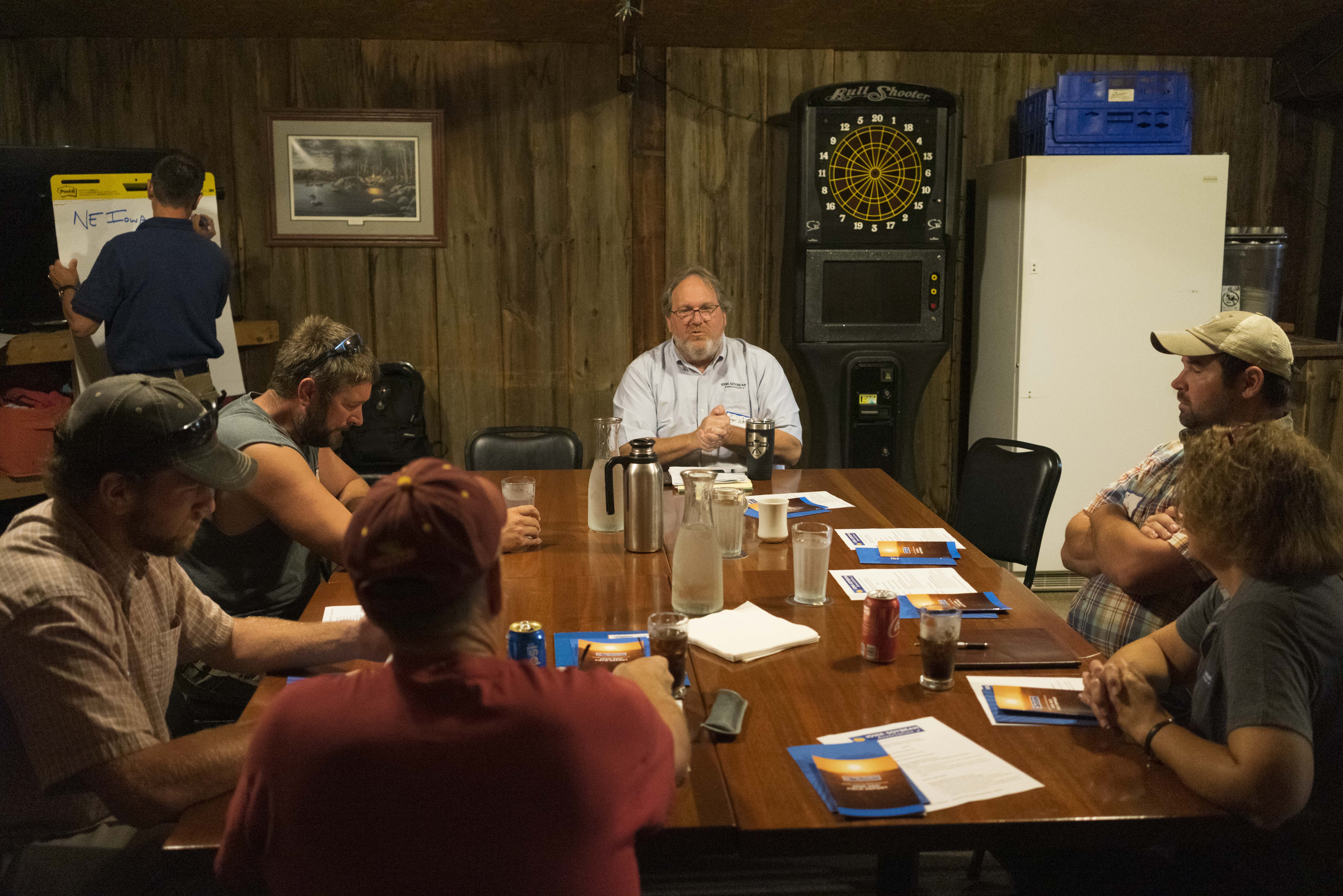
ISA Research Center for Farming Innovation Director Roger Wolf sits at a table inside the St. Olaf Tavern in St. Olaf, Iowa, meeting with area farmers. (Photo credit: Joseph Hopper/Iowa Soybean Association)
Talking it out: Regional Grassroots Town Hall series reaches halfway point
July 29, 2021
Answering questions about the needs, trends, viewpoints and future of agriculture and conservation across Iowa is easier when dozens of farmers share their thoughts around the table. The Regional Grassroots Town Hall series, hosted by the Iowa Soybean Association (ISA), kicked off in late June at Lake Darling State Park in Washington County. Since then, five of the eight town halls have been conducted, fostering open and honest dialogue about the current issues in Iowa agriculture and conservation.
Now past the halfway point, town hall moderator and ISA Research Center for Farming Innovation (RCFI) Director Roger Wolf says the series has started a conversation he hopes will continue regularly in the future.
“There is no substitute for the personal one-on-one interaction that takes place locally,” Wolf says. “It’s not at a board meeting, it’s not a project, it’s talking about the future.”
It’s been a valuable experience bringing various stakeholders together to have a conversation about the future, Wolf says.
“It’s been enlightening for ISA to go around the state and have these conversations and engage with the local leaders,” says Kristen Dearden, ISA customer service coordinator. “What I see at each of these grassroots meetings is a realization from those who are participating, that they see other regions that may be leaders (in conservation) and (saying) ‘we can be too.’”
The discussions
Farmers have discussed the history behind the implementation of conservation practices like no-till or cover crops in their region. They’re also discussing the roadblocks to conservation practice adoption, whether apathy or more tangible challenges.
“The common threads: integrating livestock was the interesting one that appeared in a lot of them, owner-operator questions and big farm versus small farm seems to be common,” says Todd Sutphin, ISA RCFI senior research program manager. “In northwest Iowa they talked about connecting with local leaders through your conservation agronomist, co-ops, that sort of thing. It was a very salient point.
He continued, “It’s interesting how some of the local issues are driving the conversations. Obviously, this is grassroots.”
“I was pleased to hear that there’s a lot of value for young people engaging in the agriculture system,” says Wolf. “There’s concern for them but there’s also a lot of interest and support for young people engaging.”
In northwest Iowa, farmers attending the meeting said their hope was for northwest Iowa to be seen as the leaders of the state in conservation practices, like southeast Iowa is often referred to today. In southeast Iowa, ISA farmer member Michael Vittetoe described emulating Washington County’s adoption of conservation practices is setting the bar too low.
The future
While the need for more funding is generally universal, many of the local leaders spoke about how they are using existing public funding in innovative ways. There are many good examples of work occurring, and local leaders are proud of their efforts. However, there is widespread recognition there is not enough funding and work being done to make a large-scale difference. Some of the dialogue at each meeting focuses on what implementation would look like if funding was made available at levels consistent with IWiLL. IWiLL refers to the Iowa constitutional amendment passed in 2010 creating the Natural Resources and Outdoor Recreation Trust Fund. The amendment earmarked three-eighths of a cent from the next sales tax increase in Iowa to help address water quality and conservation moving forward. As no state sales tax increase has been approved since the amendment’s passage, the Trust Fund sits empty today. If funded, however, it’s estimated that the Trust Fund would provide up to $180 million each year for conservation and water quality initiatives across the state.
“It’s becoming clear places that have local leaders with a plan, like watershed improvement efforts, will need more funding to get practice implementation to scale,” Wolf says. “Yet not everyone has a watershed improvement effort and I think a lot of local folks are busy doing what they do and really have not imagined how things would be different with investments at the levels proposed by IWiLL. Other stakeholders like downstream cities are saying we need investments like this. The good news is there can be real value captured with increasing funding that leads to positive outcomes for both agriculture and cities.”
The lessons learned from the intimate, farmer-led conversations will also help guide ISA’s efforts, staff members said.
The purpose for the meetings is twofold, Wolf says. The first purpose: to listen and document these local voices and find ways to amplify them. The second: to see how those voices align with our program roadmaps by which ISA RCFI is expanding its efforts including support of local projects.
“Our roadmaps articulate priority focus for programming. It has to do with local needs that are uniquely affected by geography, the soils, topography, farming systems in the region, and the local leadership.”
The conversations are meant to spur discussion among farmers and bring stakeholders together.
“There’ll be some new projects bubble up that hadn’t been on our radar screen,” Sutphin says.
This series of conversations is ongoing, Dearden says, meant to engage farmers in the process.
“This is showing that farmers have a voice, and that voice can be heard if they bring that out,” Dearden says. “Because farmers are genuinely humble people, they genuinely work with what they have. It’s getting those voices and that leadership out to leverage what they need. I think if they realize that also, then this was a success.”
To learn more about ISA and the Research Center for Farming Innovation, go to https://www.iasoybeans.com/research.
Back